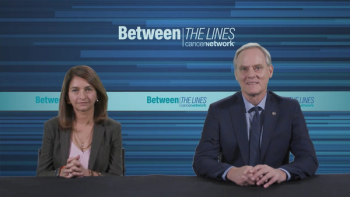
Panelists discuss how evolving MRD-driven and immune-based therapies are shaping a personalized future for NDMM management.

Your AI-Trained Oncology Knowledge Connection!


Panelists discuss how evolving MRD-driven and immune-based therapies are shaping a personalized future for NDMM management.

Panelists discuss how infection prevention and selective IVIG use are critical for maintaining safety during NDMM combination therapy.

Panelists discuss how daratumumab plus KRd demonstrates manageable toxicity and strong real-world feasibility with appropriate supportive care.

Panelists discuss how ADVANCE findings support the use of quadruplet therapy in both transplant-eligible and -ineligible patients with NDMM.

Panelists discuss how ADVANCE results show daratumumab-based quadruplets achieve high MRD negativity across risk and age groups in NDMM.

Panelists discuss how the ADVANCE trial’s inclusive design and MRD-based end points make it a model for future NDMM research.

Panelists discuss how the ADVANCE study was structured to determine whether adding daratumumab to KRd enhances depth and durability of response in NDMM.

Panelists discuss how comprehensive diagnostic and functional pretesting ensures safe and effective initiation of quadruplet therapy in NDMM.

Panelists discuss how risk stratification using cytogenetic and molecular markers is vital to tailoring NDMM therapy and improving long-term outcomes.

Panelists discuss how quadruplet therapy has become the new benchmark for NDMM, offering deeper and more durable responses than previous triplet regimens.
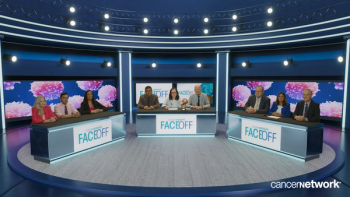
Panelists discuss how the use of CAR T-cell therapy in earlier lines of treatment for relapsed/refractory multiple myeloma could potentially improve long-term outcomes, considering factors such as patient selection, optimal timing, and the impact on subsequent treatment options.

Panelists discuss how to select appropriate bispecific antibody therapies for patients with relapsed/refractory multiple myeloma who have failed BCMA-targeted treatments, considering factors such as alternative targets, mechanisms of resistance, and emerging clinical data to provide effective subsequent treatment options.

Panelists discuss how to optimize the sequencing of bispecific antibodies and CAR T-cell therapies in relapsed/refractory multiple myeloma, considering factors such as patient characteristics, disease burden, and the unique advantages of each approach to maximize treatment efficacy and patient outcomes.

Panelists discuss how to tailor treatment strategies for a 67-year-old, BCMA-naïve woman with relapsed/refractory multiple myeloma, weighing the potential benefits of BCMA-targeted therapies against other available options in the context of her specific clinical presentation.

Panelists discuss how to approach treatment decisions for a 68-year-old woman with triple-class exposed relapsed/refractory multiple myeloma, considering factors such as prior therapies, disease characteristics, and emerging treatment options to optimize her care.

Panelists discuss how the CARTITUDE-4 trial results show cilta-cel's superior efficacy over standard of care therapies in treating relapsed/refractory multiple myeloma, potentially reshaping treatment paradigms for this patient population.

Panelists discuss how the KarMMa-3 trial results demonstrate superior efficacy of ide-cel compared to standard of care therapies in patients with relapsed/refractory multiple myeloma, potentially establishing a new benchmark for treatment in this setting.

Panelists discuss how ide-cel, a CAR T-cell therapy, demonstrates promising real-world outcomes in patients with relapsed/refractory multiple myeloma, potentially offering a valuable treatment option for this challenging patient population.

Panelists discuss how novel therapeutic approaches and combination regimens are reshaping the landscape of treatment for patients with relapsed/refractory multiple myeloma, offering new hope for improved outcomes and quality of life.
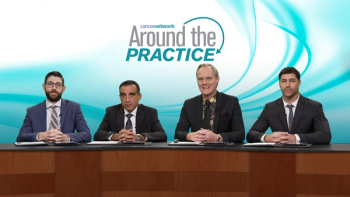
A panel of experts discuss unmet needs in multiple myeloma and offer perspectives on the future treatment landscape.

An expert panel compares bispecific antibodies with CAR T-cell therapy and discusses treatment sequencing.

Experts on multiple myeloma discuss the management of adverse effects from bispecific antibodies.

An expert panel discusses bispecific antibodies and their mechanisms of action in the treatment of relapsed/refractory multiple myeloma.

An overview of multiple myeloma treatment options in the frontline and relapsed settings.

Experts on multiple myeloma discuss approaches to laboratory workup and patient monitoring at the time of relapse.

Experts present the case of a 58-year-old patient with IgG kappa multiple myeloma and offer their initial impressions.

Clinical insights on treatment duration and the decision to place patients with newly diagnosed MM on maintenance therapy.

Insights gleaned from the MAIA trial, which researched daratumumab, lenalidomide, and dexamethasone in patients with newly diagnosed MM.

Myeloma experts present the case of a 74-year-old with transplant-ineligible newly diagnosed MM and offer their initial impressions.

An expert panel discusses maintenance therapy for patients with MM and offers insights on how induction therapy impacts treatment options.
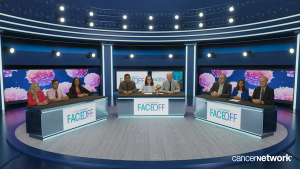
Published: November 25th 2024 | Updated:
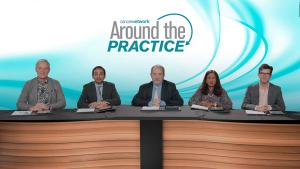
Published: February 27th 2023 | Updated:

Published: October 28th 2024 | Updated:

Published: November 11th 2024 | Updated:
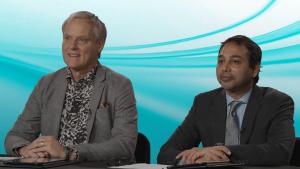
Published: February 20th 2023 | Updated:

Published: February 6th 2023 | Updated: